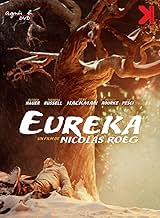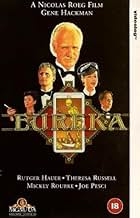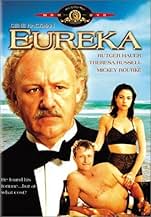IMDb RATING
5.9/10
4.2K
YOUR RATING
In 1925, a lone and obsessed Arctic prospector Jack McCann finally strikes gold. Twenty years later, he begins spiraling out of control when his only daughter becomes engaged to a man he str... Read allIn 1925, a lone and obsessed Arctic prospector Jack McCann finally strikes gold. Twenty years later, he begins spiraling out of control when his only daughter becomes engaged to a man he strongly dislikes.In 1925, a lone and obsessed Arctic prospector Jack McCann finally strikes gold. Twenty years later, he begins spiraling out of control when his only daughter becomes engaged to a man he strongly dislikes.
- Director
- Writers
- Stars
- Awards
- 1 nomination total
- Director
- Writers
- All cast & crew
- Production, box office & more at IMDbPro
Featured reviews
I've never seen a "normal" movie by Nicolas Roeg, but, even being a huge fan of his who has seen 4 or 5 of his films, this movie was...insane. After this, it's safe to say he is one of my favorite directors. His THE WITCHES (1990) is what I consider to be the greatest "children's horror film" ever made - it was one of the most influential films of my childhood, and only gets better with time. DON'T LOOK NOW (1973) featured one of the most eerie and stylish opening sequences I had ever seen, kept me almost more intrigued than I've ever felt by a film throughout, then shook me in a way I've never experienced before with it's finale - it was proto-Lynch, for one, and the whole film almost feels like a pre-cursor to Argento's SUSPIRIA (1977) to me as well, another one of my favorite films. Pure surreal horror in a way I'd never seen it before. It absolutely imprinted in me forever.
EUREKA came out between those masterpieces in 1983. It feels like a true mish-mash of film vibes and it's a smorgasbord unlike any I've ever seen. Similar to DON'T LOOK NOW, the whole expansive opening sequence feels like a bizarre nightmare but still maintains narrative cohesion - visually it's mind-bending and it grasps you with it's unique claws from the start.
Gene Hackman is a great choice for the lead as he brings a ton of viscera to this complex protagonist who isn't quite an anti-hero, but seems to be hated by just about everyone. The rest of the cast is made up of an unexpected and very intriguing blend. The legendary Rutger Hauer, who brings a ton of depth to this film as tends to whenever the script gives him the opportunity to do so, as well as Mickey Rourke, Joe Pesci in the earliest role I've ever seen him in, and more. Co-star Theresa Russell, who I was unfamiliar with previously, brings a very unique energy as well. While her performance feels the least genuine, it also colors the film with a very singular flavor of surrealism and old-fashioned drama. Often when the scenes focused on her get really intense, it starts to feel like a 40's or 50's film, which messes with your mind because nothing else in the movie feels like this aside from maybe the general plot and themes themselves.
The movie is really quite a rollercoaster. It's relatively lengthy at 130 minutes but it never really slows down and it always morphing and taking the viewer to unexpected places. I mean, after the first explosive 20 minutes, naturally the next half hour or so feels quite a bit slower in comparison, but it's an array of psychological ammunition from there on out. There's one over-the-top sequence in the second half that felt straight out of a Lucio Fulci film - it was BRUTAL, so stylish and nightmarish, and that REALLY threw me off - my jaw was dropped. Lord, I had to collect myself afterwards. Pick myself back up and put my pieces back together. Overall, it's really quite difficult to summarize what makes this film so unique using words - it simply has to be experienced to be understood. One thing is for sure though, only the legend Nicolas Roeg could have made this.
In the end, I really feel like one of the only flaws in the entire film was the epic courtroom monologue delivered by Russell towards the end of the film. It was mostly the writing, but the acting in combination just didn't work for me. It felt overblown, melodramatic, and just a little too off-kilter. I did think it worked somewhat well as an effective exaggeration of a woman having a manic breakdown, but even that just felt out of place in the context. That aside, even though the absolute ridiculousness of most of the movie, the film did conjure some serious emotional resonance throughout the second half. I was in tears as the credits began to roll. This is a severely under-looked and immensely unique movie, which all film fans should see. Do it. Roeg was a king.
EUREKA came out between those masterpieces in 1983. It feels like a true mish-mash of film vibes and it's a smorgasbord unlike any I've ever seen. Similar to DON'T LOOK NOW, the whole expansive opening sequence feels like a bizarre nightmare but still maintains narrative cohesion - visually it's mind-bending and it grasps you with it's unique claws from the start.
Gene Hackman is a great choice for the lead as he brings a ton of viscera to this complex protagonist who isn't quite an anti-hero, but seems to be hated by just about everyone. The rest of the cast is made up of an unexpected and very intriguing blend. The legendary Rutger Hauer, who brings a ton of depth to this film as tends to whenever the script gives him the opportunity to do so, as well as Mickey Rourke, Joe Pesci in the earliest role I've ever seen him in, and more. Co-star Theresa Russell, who I was unfamiliar with previously, brings a very unique energy as well. While her performance feels the least genuine, it also colors the film with a very singular flavor of surrealism and old-fashioned drama. Often when the scenes focused on her get really intense, it starts to feel like a 40's or 50's film, which messes with your mind because nothing else in the movie feels like this aside from maybe the general plot and themes themselves.
The movie is really quite a rollercoaster. It's relatively lengthy at 130 minutes but it never really slows down and it always morphing and taking the viewer to unexpected places. I mean, after the first explosive 20 minutes, naturally the next half hour or so feels quite a bit slower in comparison, but it's an array of psychological ammunition from there on out. There's one over-the-top sequence in the second half that felt straight out of a Lucio Fulci film - it was BRUTAL, so stylish and nightmarish, and that REALLY threw me off - my jaw was dropped. Lord, I had to collect myself afterwards. Pick myself back up and put my pieces back together. Overall, it's really quite difficult to summarize what makes this film so unique using words - it simply has to be experienced to be understood. One thing is for sure though, only the legend Nicolas Roeg could have made this.
In the end, I really feel like one of the only flaws in the entire film was the epic courtroom monologue delivered by Russell towards the end of the film. It was mostly the writing, but the acting in combination just didn't work for me. It felt overblown, melodramatic, and just a little too off-kilter. I did think it worked somewhat well as an effective exaggeration of a woman having a manic breakdown, but even that just felt out of place in the context. That aside, even though the absolute ridiculousness of most of the movie, the film did conjure some serious emotional resonance throughout the second half. I was in tears as the credits began to roll. This is a severely under-looked and immensely unique movie, which all film fans should see. Do it. Roeg was a king.
Roeg draws on Who Killed Sir Harry Oakes, as well as Skakespeares tempest and some Robert Service to create this tale of a man who "once had the world, now i just have the everything". a film of thems and more subplots than plot-and many themes. hackmann is a perfect Roeg actor-like Sutherland, Fox and Bowie, but some other performances are not as comfortable, or not as well written -particularly the women. A film that is worth repeated viewing
Eureka is an undertaking where the director has a vision and, against all odds, follows it through.The downside was the woeful distribution of the film on completion, resulting in lack of audience participation due to a delayed release and scant showings (it played in just two London cinemas); just goes to show that certain distribution companies are flummoxed when they have a unique picture to promote. Eureka boasts a great across-the-boards cast, with Gene Hackman giving his customary all in a driven and committed performance, ably supported by Theresa Russell, Rutger Hauer, Joe Pesci and in a minor role, Mickey Rourke. Director Roeg's use of locations, his skill in cutting, the harnessing of atmosphere and the adroit use of music add up to an intriguing whole, loosely based on fact. It was made at the start of the 80's after an astonishing run of films by Roeg.
Actually, this is a very quirky film, immersed in other things; in this case it is the Kabbalah. (This is made clear when Rutger Hauer wears a shirt with the Tree of the Kabbalah drawn on the front to a formal dinner in the middle of the film.) I found this release of the film both impressive and a let-down. It is impressive because of its ambition as a film; it is a let-down because (the way it is edited) most sense of "suspense" is replaced by puzzlement; this is The Zohar meeting Hollywood and suffering from the meeting. In the end, I don't feel this movie has any grand message for the world, except perhaps the pointlessness of having so much wealth if you don't do anything with it.
Overall rating: 7 out of 10.
Actually, this is a very quirky film, immersed in other things; in this case it is the Kabbalah. (This is made clear when Rutger Hauer wears a shirt with the Tree of the Kabbalah drawn on the front to a formal dinner in the middle of the film.) I found this release of the film both impressive and a let-down. It is impressive because of its ambition as a film; it is a let-down because (the way it is edited) most sense of "suspense" is replaced by puzzlement; this is The Zohar meeting Hollywood and suffering from the meeting. In the end, I don't feel this movie has any grand message for the world, except perhaps the pointlessness of having so much wealth if you don't do anything with it.
Overall rating: 7 out of 10.
I too first saw this in London when it came out May 1983, at the Screen on the Hill. It was my O-level year, and I was a skinny, awkward 15-year-old, desperately trying to get into my first 18-rated film. It worked. But was it worth it? The film has an extraordinary opening section, as Gene Hackman finds the gold under the snow-encrusted earth, culminating in a spectacular, slow-motion explosion of rock and snow. Set to extracts of Wagner's DAS RHEINGOLD, it's unforgettable, thrilling cinema, and had my jaw dropping into my cappuccino. We also have the sight of a dying, half-frozen man blowing his brains out again and again, bringing to mind the disjointed, hallucinatory quality one recognises from the director of THE MAN WHO FELL TO EARTH and DON'T LOOK NOW. Stunning, disturbing stuff.
Unfortunately the momentum quickly slackens as we cut forwards in time to a rather dull, plodding melodrama about a Kane-like man who in his anguish says, "Once I had it all...now I only have everything." (Coming after the prologue, this also applies to the film itself.) There's some nasty scenes involving voodoo and Rutger Hauer doing something rather strange with a python, some gut-wrenching violence involving a blow-torch and the contents of a pillow, and a soap-opera court-room finale that feels as if it's wandered in from an entirely different film altogether. There are rumours of a different film lurking in this exuberant mess: one of the film's stars has hinted that it was not Roeg's final version that we saw. But I couldn't call this a success. Roeg fans should check it out as an oddity, but be warned: after the brilliant beginning, it's downhill all the way.
Unfortunately the momentum quickly slackens as we cut forwards in time to a rather dull, plodding melodrama about a Kane-like man who in his anguish says, "Once I had it all...now I only have everything." (Coming after the prologue, this also applies to the film itself.) There's some nasty scenes involving voodoo and Rutger Hauer doing something rather strange with a python, some gut-wrenching violence involving a blow-torch and the contents of a pillow, and a soap-opera court-room finale that feels as if it's wandered in from an entirely different film altogether. There are rumours of a different film lurking in this exuberant mess: one of the film's stars has hinted that it was not Roeg's final version that we saw. But I couldn't call this a success. Roeg fans should check it out as an oddity, but be warned: after the brilliant beginning, it's downhill all the way.
Weird, sloppy, self-indulgent, meta-physical, sometimes boring, sometimes hallucinatory: all these things describe this misfire from director Nicolas Roeg. Gene Hackman stars as a gold prospector in Alaska during the final days of the gold rush. Most of the people have given up and gone home at this point, but Hackman refuses. After a strange encounter with a meteor (I think) he receives some kind of lucky rock (I think) that gives him the extra push to find his gold strike. And does he ever. Cut to decades later, and he's fabulously wealthy, with a giant estate named Eureka. His grown daughter (Theresa Russell) has married a European playboy (Rutger Hauer) that dad doesn't approve of. There's also a shady consortium of some sort, headed by Jewish tough guy Joe Pesci (!) and represented by Italian lawyer Mickey Rourke (!), that needs Hackman's financial backing for some new endeavor.
The cinematography is beautiful, as it usually is in Roeg's films, but the plot is a mess of ham-handed symbolism and uninspired dramatics. The terrific cast, which also includes Ed Lauter, Joe Spinell and Corin Redgrave, is good, with Hackman the stand-out, as usual. Rourke looks scared and uncomfortable, which fits with his character, but he comes across more like he's fully aware of how wrong he is in the role. Russell and Hauer are both beautiful, and they both spend much of the film in various states of undress. There's also one of the most brutal, protracted murder scenes I've seen in a film in a long time. It's starts off shocking, but becomes rather ludicrous the longer it's dragged out. I can't really recommend this film to anyone except Hackman fans or fans of bizarre obscurities.
The cinematography is beautiful, as it usually is in Roeg's films, but the plot is a mess of ham-handed symbolism and uninspired dramatics. The terrific cast, which also includes Ed Lauter, Joe Spinell and Corin Redgrave, is good, with Hackman the stand-out, as usual. Rourke looks scared and uncomfortable, which fits with his character, but he comes across more like he's fully aware of how wrong he is in the role. Russell and Hauer are both beautiful, and they both spend much of the film in various states of undress. There's also one of the most brutal, protracted murder scenes I've seen in a film in a long time. It's starts off shocking, but becomes rather ludicrous the longer it's dragged out. I can't really recommend this film to anyone except Hackman fans or fans of bizarre obscurities.
Did you know
- TriviaDirector Nicolas Roeg has said of this movie: "I was initially interested in a character who wanted to satisfy an all-consuming desire...'that's what I want'...but when he gets it what happens after his brief ecstatic moment? Nothing more than left over life to kill."
- GoofsJack McCann's discovery of the gold is several times said to take place in the winter of 1925. At this time, McCann has no family and is a complete loner. Yet, when the film moves forward to 1945, he has a married daughter who is said to be twenty years old in the early part of 1945. Her mother, McCann's wife, is an aristocratic Englishwoman who has married him for his money, and who therefore cannot have married him before 1926 at the earliest, which makes the daughter unlikely to be more than 18 in the 1945 scenes. Theresa Russell, who plays the daughter, was in her late twenties when the film opened.
- Quotes
Jack McCann: Once I had it all. Now I just have everything.
- Alternate versionsAlthough the UK cinema version was intact the 1986 Warner video release was missing 7 seconds from the death of Jack McCann, notably shots of a flame thrower being run over his body and face. These were not cut by the BBFC so presumably they were distributor edits. DVD releases are fully uncut.
- ConnectionsFeatured in Loose Talk: Episode #1.7 (1983)
- How long is Eureka?Powered by Alexa
Details
Box office
- Gross US & Canada
- $123,572
- Gross worldwide
- $123,572
Contribute to this page
Suggest an edit or add missing content


































